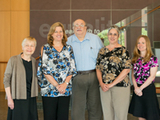A Continuum of Care
UMBC Center for Aging Studies researchers receive $1.4 million grant for work to enhance the well-being of older adults.
There are nearly 5,000 adult day care centers in the United States, but estimates from several health organizations make the case there should be at least double that number. Why is there such demand for these facilities and how are they different from other assisted living centers for older adults?
Robert Rubinstein and a team of researchers from UMBC’s Center for Aging Studies (CAS) recently received a $1.4 million grant from the National Institute on Aging for the study “Adult Day Services (Adult Day Care): Cultural Contexts and Programming Effects.” Rubinstein, professor of sociology and anthropology, director of the Center for Aging Studies, and principal investigator for the study, says the goal is to understand how adult day services (ADS) programming affects clients’ health and well-being, something that hasn’t been examined closely before.
“If you imagine care for older people on a continuum, is it better for somebody to stay alone in their home all day, or is it better for them to go out to some kind of group that does activities?” Rubinstein says.
Adult day care centers are facilities that provide services for adults who need assistance during the day so they are able to continue living at home. There are three models of care provided at ADS centers: medical, social, and mixed care, with everything ranging from an on-site nurse taking blood pressure and administering lipid screenings to gaming activities for clients.The Center for Aging Studies plans to study six ADS facilities throughout Maryland to better understand the daily life of clients and their families, to inform service providers, consumers, policymakers, and health care professionals of the benefits and concerns that affect quality of life and care in ADS centers.
“It’s apparent…if you even spend ten minutes in one of these facilities, the people there for the most part love it and it really brings them out of their shells. Part of that social relationship that they have with other people really is a cognitive function to get their minds active and invested in something,” Rubinstein observes.
The CAS team of researchers is using ethnographic research methods to observe and interact with clients and staff at adult day care centers to gain an understanding of what takes place on a daily basis. A second phase of the research will involve more formal interviews with a set of guiding questions to further understand the benefits and effects of programming and decision-making at ADS centers for clients, families, and staff.
The ADS project, which is a four-year study, is one of more than 20 multi-year studies, totaling over $20 million in funding, that the Center for Aging Studies has conducted since 1997. Recent projects include “Autonomy in Assisted Living” and “The Subjective Experience of Diabetes among Urban Older Adults.” Faculty and staff conduct this interdisciplinary research through close collaboration with graduate and undergraduate students who are committed to furthering a comprehensive approach to the study of aging.
A major overarching goal of the center is to demystify aging and help people realize that older adulthood is an important stage of life. Rubinstein reflects, “For me, the reason I do this work is that it’s so important that we come to know older peopleas people because there’s so much unconscious discrimination.” This ongoing challenge motivates Rubinstein and the new generation of aging researchers he is training through his center’s ongoing work.
(5/14/2015)
(Reposted from http://umbc.edu/window/aging_studies_research)
Posted: June 24, 2015, 1:50 PM
